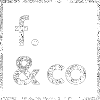The revolutionary within
For the first time on Friday Feb. 28th 2014, the Montreal chapter of Creative Mornings handed its monthly mic to a university professor, Sylvain David.
A former punk band member, David has followed a path intriguingly made of both a troubled relationship to authority, yet a full embrace of the institutional sanction. As a doctor in literature, a professor, and thus, an employee of the State, David is paid to teach nihilism by the very power he used to denounce, and in many ways, still does.
How is one to reconcile a near-complete absence of exteriority to "society" with an utmost desire to scream out loud the injustice that abounds in the world? In the face of increasing inequalities, an informed opinion is difficult to come up with. Suffice to look at the propaganda and disinformation that surrounds rebellious movements to rapidly conclude that most of it remains misinformed, if not disingenuous. Which is not to say that, in many cases, it isn't the reflection of a legitimate sentiment.
As a concept, rebellion stems from the latin re-bellis, to make war again. It is the war of the defeated. This explains, for instance, why several political pseudo-intellectual groupings still take to Marxism as if it were a coherent framework. Their ideas having been rendered obsolete by 20th century experiments, they see in the participative and collaborative economies an opportunity to reinterpret their dated frameworks of opposition and class warfare. Richard Florida notwithstanding, contemporary critiques of capitalism find little structural concepts to articulate their thoughts. They find refuge in other dated concepts like neoliberalism, new world orders, and a truncated analysis of geopolitics.
The fact is that most rebellious movements find their rebellion to be sufficient in itself. Rebels in these groups define themselves in opposition to something, and despite the moving target, they remain residual, reactionaries.
This unfortunate posture, while it is gaining ground in intellectual circles at both extremes, take foot in what David describes as "the invention of adolescence", a socio-economic phenomenon which led the media, brands and scholars alike to start considering young adults as an entirely autonomous group, to be analyzed distinctly.
Unscrupulous marketers obviously saw there an opportunity, and so was born an entire mass-culture of rebellion, whose icons would come to encompass varied musical "products" such as the Sex Pistols, the Clash, Rage Against the Machine and, most recently, Justice or Die Antwoord. With these came a whole paraphernalia of cheap consumer products, catering to the "needs" of these new "rebels" — Che Guevara t-shirts, leather boots and Anonymous masks — an industry in its own right, a business segment with its very own, delineated needs and trends.
This absence of exteriority does not mean that genuine rebellion is impossible, but rather, that it needs to come from the inside. Rebels need to find ways to embed their claims and demands from within, to lie at the frontier between spaces, and define new ones for collective sense-making. The true revolutionaries of today have understood this reversal, and taken to the heart of the system rather than at its periphery. The epitome of such integrated rebellion is the Occupy movement, which strikes at the center, takes the place, challenges the means and the ends.
Clearly, Sylvain David's talk struck a chord with many attendees. His first book, an experimental essay entitled "To make violence" (Faire violence), is entirely written in the infinitive. It defines what the author himself describes as a kind of first-person-shooter literature, in which the reader is embedded in the action. We needed no more: a purpose, a man, some ideas. Both for, and against. Yet from within.
Though largely inspired by it, this post is not an exact account of Sylvain David's Creative Mornings keynote talk but the perspective of its author.


